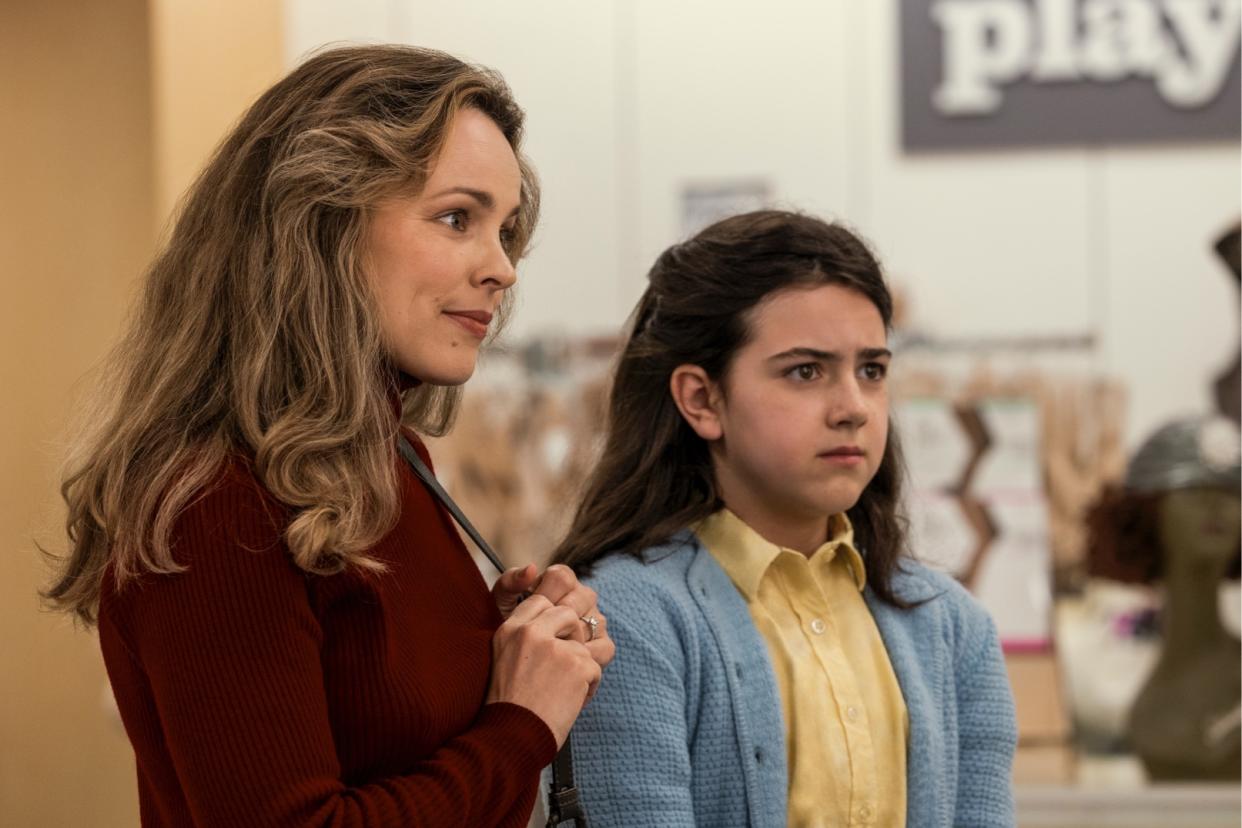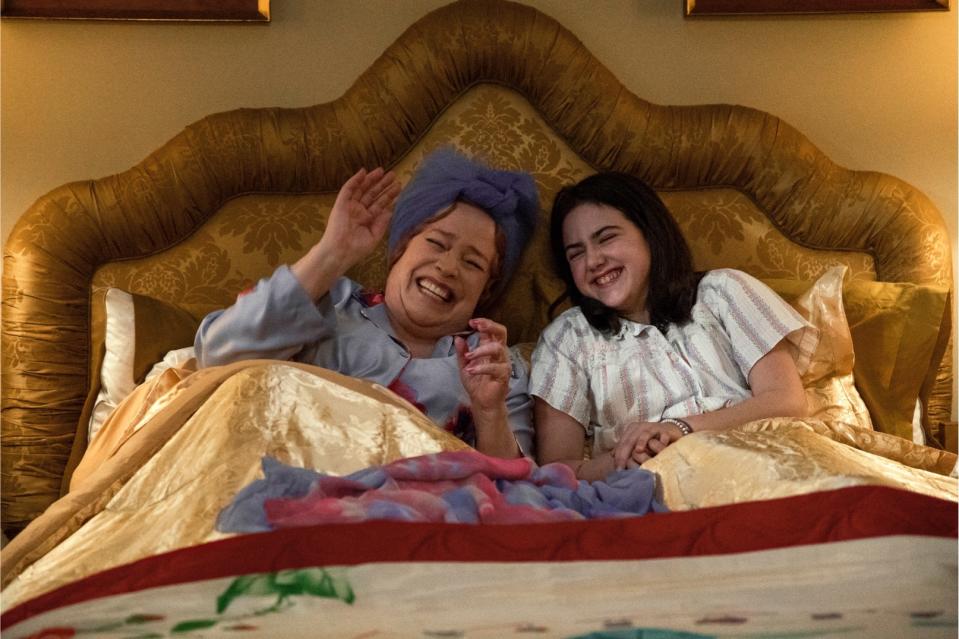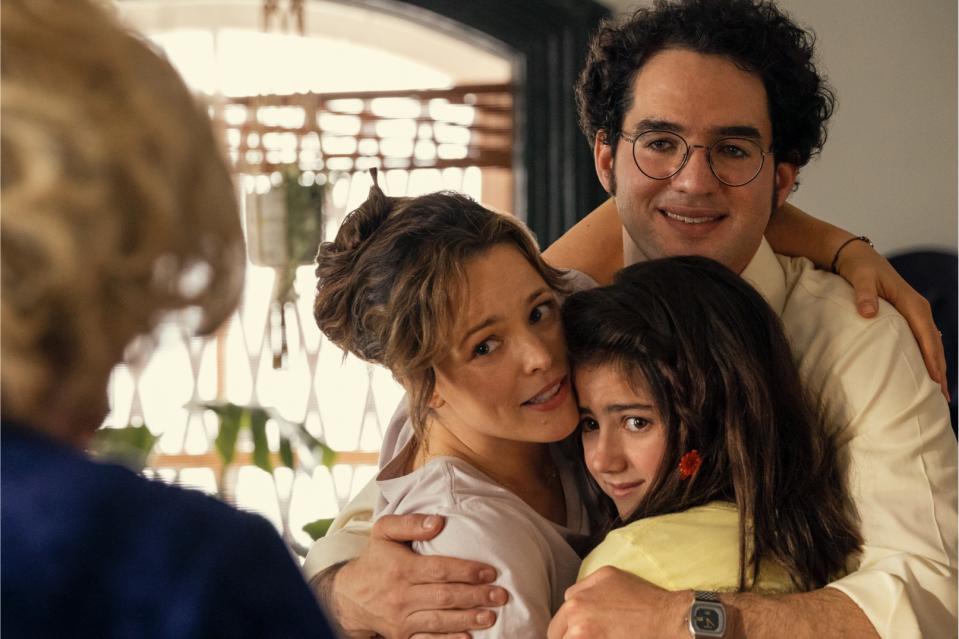Are You There God? It's Me, Margaret Does Justice to a Teen Classic—and Speaks to Grownups, Too

- Oops!Something went wrong.Please try again later.
- Oops!Something went wrong.Please try again later.
Rachel McAdams and Abby Ryder Fortson in 'Are You There God? It’s Me, Margaret' Credit - Courtesy of Lionsgate
Long before young-adult novels became the profitable juggernaut they are today, there was Judy Blume, who wrote about subjects and experiences—puberty, body-image anxiety, teen sex—that a certain sort of parent would never broach with their kids. Her frank approach was enough to get many of her books banned: in the mid 1980s they became a favorite target of the far-right Christian group Moral Majority, and one book in particular, Blume’s 1970 best-seller Are You There God? It’s Me, Margaret, has continued to raise ire among uptight types across the decades. Through the 1990s and 2000s, that book has held a comfortable spot on the American Library Association’s list of 100 most frequently banned works. What better endorsement can a book earn? And can a movie version do it justice?
The wonder of Kelly Fremon Craig’s film adaptation of Are You There God? isn’t just that it deals directly, and without condescension, with the vagaries of preteen awkwardness. It’s that it speaks so ardently to the adolescent in all of us—particularly, maybe, women who are going through menopause or already on the far side of it, an event that in some ways returns us to a lunar landscape whose contours we’d forgotten. The heroine of this story, set in 1970, is 11-year-old New York City girl Margaret (Abby Ryder Fortson) who, as the movie opens, is just returning home from a summer away at camp—we get brief glimpses of the fun she had, running and laughing with friends, in what we know are among her last moments of just being a little kid.
Margaret is barely off the camp bus when her father Herb (Benny Safdie) and gentle, art-teacher mom Barbara (Rachel McAdams) break the news that the family is moving to the Jersey suburbs. It’s the beginning of the end of her world: Margaret doesn’t want to leave the family’s cozy, cluttered apartment, or her friends at school, or, most of all, her grandmother, Sylvia (Kathy Bates), a firecracker decked out in splashy prints and gumball-vivid costume jewelry. But this decision is beyond her control. She and her mother and father make the trek to a place that seems like a different planet from New York, with its scruffy bodegas and lattice network of fire escapes. The sudden sight of a supermarket set far off from the street, with an actual parking lot around it, is as much a shock to our system as it is to Margaret’s. What do people do with so much space?

Yet it’s not hard for Margaret to make new friends. Even before the moving cartons are unpacked there’s a girl around Margaret’s age coming to the door. Nancy (Elle Graham), lives nearby—“in the bigger house up the street,” she says brightly to Barbara—and where Margaret is thoughtful and somewhat cautious about the world, Nancy, brimming with faux sophistication, is ready to storm right into it. She almost instantaneously invites Margaret to be part of a secret club with two other girls, Gretchen (Katherine Mallen Kupferer) and Janie (Amari Alexis Price). There are rules: “No socks!” Nancy admonishes, and Margaret dutifully complies, even though her loafers give her blisters without them. The girls must all wear bras, even though Nancy, further ahead than the rest of them, is the only one who isn’t stuck with the stretchy training variety. They must each keep a book listing the names of the boys they like. (Margaret has her eye on one who’s escaped the radar of the others, a winsome-looking kid named Moose, played by Aidan Wojtak-Hissong.) And, perhaps most significantly, each girl is sworn to alert the others as soon as she menstruates for the first time, an event they all see as a triumphant milestone, though they won’t admit they’re a little scared of it too. At school, as the girls watch the classic “here’s what it means to be a woman” educational film that generations of preteens had to suffer through, the look on their faces says it all: So wait—that totally disgusting-sounding thing is actually going to happen to me?
Even so, Margaret doesn’t want to be the last of her friends to reach that marker of womanhood. What’s more, simply because she’s 11, she’s confused about just about everything, which is what leads her to try prayer on for size—though even that route provides little comfort, because her mother (raised by devout Christian parents, from whom she’s estranged) and her father (Jewish) have decided to let her choose her own religion when she’s ready.
Read More: The Best Judy Blume Books to Read at Every Age
Margaret’s little-girl doubts feel huge to her—these are the things we forget once we leave adolescence behind. We forget how much we wanted to rush to grow up, and also how, once it started happening, we weren’t sure how to adjust to this rattling new normal. Are You There God?, both funny and generous, brings it all back. Craig has navigated similar territory before: she wrote and directed the perceptive and vibrant 2016 comedy-drama The Edge of Seventeen. And she gets the tone and vibe of Are You There God? just right. Anticipating the onset of menses, and wanting to be prepared, Margaret and Janie suffer the embarrassment—there’s a guy behind the counter—of buying their first box of sanitary pads at the drugstore. (The brand is “Teenage Softies.”) At one of those ubiquitous preteen basement parties, the kids play one of those ridiculous yet terrifying kissing games—devised by Nancy, naturally—and Margaret gets matched with the cutest, coolest boy in the class, who, even though he later turns out to be a jerk, in that moment bestows the gentlest of kisses. (The music on the soundtrack is Dusty Springfield’s version of “Son of a Preacher Man,” one of the great songs about honey-sweet stolen moments.) And Craig knows how to direct our gaze in the subtlest ways. As Margaret watches Moose replace a fallen bird feeder in the branches of a tree, somehow we notice, just as she does, that he has just the littlest bit of hair under his arms. It’s a moment that brings you back to the days before you knew everything, where there were so many mysteries left to unfold.

This is also one of those rare teen movies where the parents aren’t duds: McAdams and Safdie are wonderful as parents who know they have to largely sit on the sidelines as Margaret navigates all this new confusion, though they’re also at the ready to catch her when she slips. The costuming—from Herb’s dad turtlenecks to Barbara’s art-teacher sandal-and-skirt combos to the other moms’ pristine twin sets—is perfect. (The costume designer is Ann Roth, a legend for a reason.)
And best of all, this is a movie where the kids really look like little kids, not just older actors playing younger. Their teeth haven’t yet evened out—they still have that ridged Chicklet look. Their hair gets messy as they go through their day. And Fortson is marvelous, capturing all of Margaret’s eager earnestness. Margaret has a subterranean intelligence that she can’t yet see, particularly in the context of Nancy’s dazzle (though, as we learn, Nancy has her own vulnerabilities). Of course, at least on the surface, Are You There God? It’s Me, Margaret, adapted from an evergreen book, is designed for young people. But there’s a transportive quality about it too. I’m not sure it’s possible to watch it as a grownup and not see, somewhere on that screen, a version of the awkward little person you used to be. Maybe that feeling is particularly acute if you’re a woman, and it might hit even harder if you’ve reached the 50-year mark, when all the things you so eagerly waited for are well behind you. Now you know all the secrets. But deep inside, there will always be the girl who knew nothing at all.

